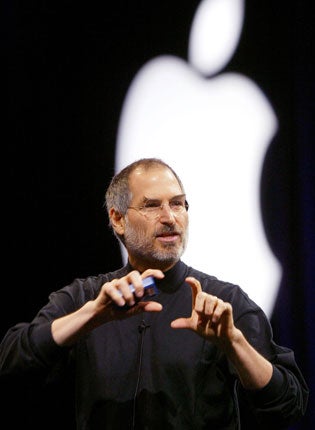First the iPod, then the iPhone. So is Apple about to launch iSlate?

Your support helps us to tell the story
From reproductive rights to climate change to Big Tech, The Independent is on the ground when the story is developing. Whether it's investigating the financials of Elon Musk's pro-Trump PAC or producing our latest documentary, 'The A Word', which shines a light on the American women fighting for reproductive rights, we know how important it is to parse out the facts from the messaging.
At such a critical moment in US history, we need reporters on the ground. Your donation allows us to keep sending journalists to speak to both sides of the story.
The Independent is trusted by Americans across the entire political spectrum. And unlike many other quality news outlets, we choose not to lock Americans out of our reporting and analysis with paywalls. We believe quality journalism should be available to everyone, paid for by those who can afford it.
Your support makes all the difference.So where next for Apple, the company that has for 11 years turned everything it touches into gold? After revolutionising the music and mobile phone industries, it has returned to its roots with a piece of kit that it hopes will redefine computing.
Apple has long been rumoured to have its developers working on a handheld touchscreen computer known in the industry simply as "the tablet". Media executives hope the product will herald a new era, acting as a single device to download books, magazines and newspapers and watch streaming video.
Talk that the company will unveil this device next month have hit fever pitch, with the idolatrous displaying a fervour not seen since the advent of the iPhone.
The California-based company's shares have soared to an all-time high as a result of speculation that the tablet, which many believe will be called the iSlate, will be the next device off Apple's production line.
Apple has never acknowledged that such a device exists, but the company has booked the Yerba Buena Centre for the Arts in San Francisco to make a "major product announcement" for 26 January 2010. It is the same location where Steve Jobs, the chief executive, co-founder and driving force behind the company's resurgence, made his return earlier this year after recovering from a liver transplant.
While Apple has remained, as always, hugely secretive, one "insider" let slip to The New York Times: "Let's just say Steve is extremely happy about the new tablet."
Gossip about the device itself has varied wildly from talk of a 7in screen to something not much larger than the existing iPod Touch. It could cost $500, then again it could cost double. The one rumour that has gathered significant traction is its name. The blog MacRumours.com revealed that Apple had bought the rights to the iSlate.com domain name.
The idea of a tablet computer is not new, but it has faced significant technical hurdles. Developers have struggled with the conundrum of how to give it enough battery power to run a full-colour screen with constant internet access that can stream movies and serve other computing needs. "The truth is that most of us don't understand the allure of a tablet computer because they've all sucked up until now," said the technology writer MG Siegler on the TechCrunch blog.
Mr Siegler added: "The mouse and keyboard will one day die and everything will be touch and gesture based. We'll be living in a future with Minority Report, Star Trek and Avatar interactive technology. It will happen and the tablet computer is the latest, and perhaps most important step in a line of technology taking us there."
Apple has a knack of getting over those details and overhauling whichever device it turns its hand to, starting with the personal computer. Earlier this decade, the iPod changed the way people listen to music, forcing the music industry to change radically. The iPhone, from 2007, had a similar impact on telecommunications, and introduced applications to the mainstream. Mr Siegler said if the tablet succeeds "it will likely redefine the role of computing in our lives just as the iPhone has. That's exciting. And that's why we care so much about it".
Core business Key breakthroughs
*Macintosh (1984)
Apple's big breakthrough was the first mainstream personal computer to feature a mouse.
*iPod (2001)
After its release, the iPod quickly overshadowed other portable music players. More than 220 million iPods have been sold worldwide – making it the best-selling machine of its kind in history.
*iTunes Store (2003)
The online music shop quickly led its field. It has been hailed as the music industry's best chance against free filesharing.
*iPhone (2007)
With touchscreen, camera, iPod and internet portal, the iPhone revolutionised mobiles – and the rise of the App store made it still more useful.
Join our commenting forum
Join thought-provoking conversations, follow other Independent readers and see their replies
Comments